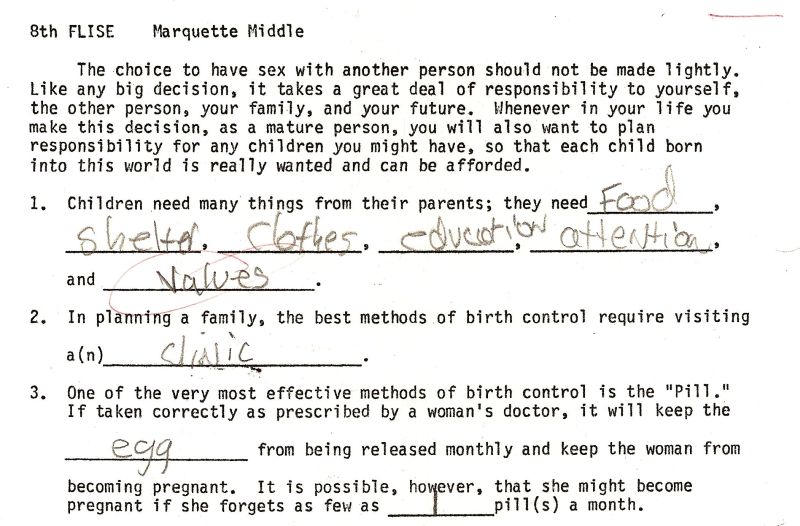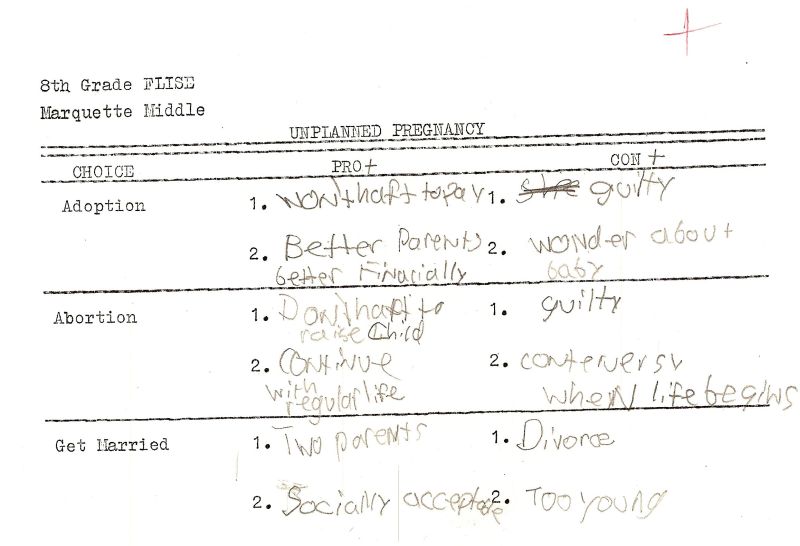
A sex education worksheet I completed in the 8th grade. (1987) The straight forward common sense options presented here would cause media sensations today. (Click on image to view in full)
The Wisconsin Assembly this week is taking up a bill passed by the state Senate last year that will repeal the Healthy Youth Act, (Sec. 118.01) a law that according to the Wisconsin Alliance for Women’s Health “sets a minimum standard for sex education in Wisconsin – requiring that sex education taught in Wisconsin public schools to be medically accurate, age-appropriate and comprehensive”. The repeal attempt seems like another desperate attempt by conservatives to impose a failed monolithic approach to sex education.
It didn’t used to be that way; my own experience with sex education in schools seemed normal and non-controversial. During a recent move, I did a massive sort through some old papers and discovered a couple of sex ed worksheets from eighth grade (1987) that would likely cause Rick Santorum to throw up a lung and Rush Limbaugh to heat up and float away.
The recent flare-up over contraception, abortion, and religious values highlights an interesting regression we have had in this country over attitudes toward sex and women’s health care. We are starting to backtrack on some of the simple stuff like access to abortion services, basic access to contraception, and now sex education.
I admit that my classroom sex education was by way of the Madison Public Schools in the 1980s, which was inherently progressive in form and practice. I can’t remember if sex ed was on the curriculum earlier than fifth grade, but I remember a woman in her early 20s coming to class that year (1983-84) and standing in front of us, somewhat awkwardly discussing the reproductive systems. I don’t remember how she demonstrated the male system, but do recall that as she described the female plumbing, she was using her fingers to draw it out on the front of her jeans.
The way she hurried through the presentation made me wonder if she had lost a bet, or she was a graduate student researching alternative ways to present this subject matter. My other recollection was that she was pretty cute, with curly strawberry blonde hair. And to think Van Halen’s album would drop that year and David Lee Roth would sing about what all us boys were thinking. Either way, the subject matter was not revisited again until eighth grade, which left a few open years for people like Madonna to fill in the emotional gaps in my human sexual development.
The choice of having sex with another person should not be made lightly, like any big decision, it takes a great deal of responsibility to yourself, the other person, your family, and your future. Whenever in your life you make this decision, as a mature person, you will also want to plan responsibility for any children you might have, so that each child born into this world is really wanted and can be afforded.
Most would agree with the sensibility of the first sentence, but the last sentence would send social conservatives into tizzy. However, their solutions – such as refraining from sex, which they portend is most effective if they seek religious inspiration, and carrying any pregnancy to term that fails the first line of defense – disproportionately fails women on the front end and both woman and child on the back end.
The worksheet asked me about many things that would fill endless hours of cable talk shows today, such as the most effective drug store birth control method, and that some of the best methods of birth control require visiting a clinic. I was asked about condoms, gels, foam, diaphragms, jelly, and how the “pill” stops an egg. Plus, I was told that some forms of birth control stop sexually transmitted diseases. Gasp!
While not all kids were lucky enough to grow up in Madison, where often they let the information speak for itself, this seemed to be a high point for dissemination of educational information about sex to school-age children. The next two decades are filled with smoking craters where responsible sex ed curricula used to be – maybe not in Madison, but in many places where abstinence-only education was pushed first by conservative-minded local officials, then by state legislators, and finally endorsed at the national level by President George W. Bush.
Abortion services have experienced a similar slide, as successive Supreme Court decisions have allowed states to put increasingly onerous restrictions on access to abortion services. These restrictions reached an Orwellian climax with a recently approved bill in the Virginia legislature that requires an invasive ultrasound using a probe before an abortion can proceed. Even the name “Transvaginal Ultrasound” sounds like it was ripped straight from Orwell’s 1984.

This is a worksheet I completed in 8th grade (1987) on the pros and cons of each option available following an unplanned pregnancy. Many of today’s sex ed programs would not be allowed to contain or discuss certain subject matter on this sheet. As you can see I got a “+” for my answers. (Click on image to view in full)
That leads me to the other worksheet I found. Let’s say the Madison schools were not effective in getting through to me, or I was bad at following the directions on how to effectively deploy my birth control. To prepare me for that eventuality, we filled out an “Unplanned Pregnancy” worksheet. Here we had to list the pros and cons of adoption, abortion, getting married, single parenthood, foster parent, and dumping the child on family members.
If you take a moment to think about it, none of these options are a panacea, but learning about these eventualities early enough seems more likely to prevent the most undesirable options for a young person – like abortion, single parenthood, and foster care. Conservatives don’t want to prevent pregnancies, and don’t want to terminate the ones that are unplanned, yet their only solution is to advocate strategies that require young people to subjugate their emotions when they are at their peak level, and at their lowest understanding of them.
Once the child is born, conservatives’ only support is to say: “you made the right choice”. Beyond that, the parents, but usually the mother, is on her own, as we have yet to see right-to-life folks provide a nationwide system of financial and emotional support for these children.
As you can see, I was given a wealth of information early in my life, but that did not encourage me to have any more sex than most any other child growing up, or increase the opportunities. I am not sure abstinence-only sex ed would have had much different results, because my choices were more informed by good parenting than by what was taught in the schools. In the end, is this really about what is taught in the schools, or is it about deflecting attention away from the responsibility of parents to raise their children? As the psychiatrist said to Ted in a scene from Something About Mary, “Oops, time, she’s up. We’ll delve into that next week”.

